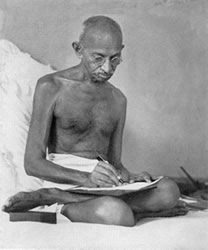
P.O. SEVAGRAM, DIST.WARDHA 442102, MS, INDIA. Phone: 91-7152-284753
FOUNDED BY MAHATMA GANDHI IN 1936
Short Stories For Everyone
Inspiring incidents from Gandhiji's Life: Selected from the book Everyone's Gandhi
(For the children in the age group of 10 to 15 years)

SHORT STORIES FOR EVERYONE
Gandhi's inspiring short stories selected from the book Everyone's Gandhi
Editor by : Rita Roy
Table of Contents
- All for A Stone
- A Car And A Pair of Binoculars
- My Master's Master
- Enter The Monkeys
- Premchand Quits His Job
- Returning His Medals
- Basic Pen
- Prisoner No. 1739
- Gandhi's White Brother
- Who Saw Gandhi?
- An Early School
- An Unusual March
- Spiritual Heir
- The Less You Have The More You Are
- An Old Goat Talks
- The Phoenix Settlement
- Gandhi in Amsterdam
- Something To Be Shy About?
- Gandhiji The Matchmaker
- Gandhi's Army
- Dandi Snippet
- Hiding Something
- The Image Maker
- Creative Reader
- Postcards To The Rescue
- A Non-violent Satyagraha 214 Years Ago
- Gandhi And Delhi
- Gandhiji's Constructive Programme
- Gandhi Looks At Leprosy
- Baba Amte
- They Gave Peace A Chance
- From Mahatma To God
- Customs Are Out of Fashion
- The Man 'Charlie' Wanted To Meet
- It Came Naturally To Him
- Crossing The Sea of Narrow-Mindedness
- Wear Clothes As They Should Be Worn
- Education: For Life, Through Life
- The Abode of Joy
- To Cling to A Belief
- The Fruit of A Child's Labour
- An Ideal Prisoner
- How A Film Became Something More
- Gandhi: Beyond India
- Gandhi's Life-Saving Medicine
- Understanding The Mechanics of Life With Gandhi
- The Lokmanya and The Mahatma
- Man's Gift To Nature
- Gurudev And His Mahatma
- One-man Boundary Force
- What Does Mahatma Gandhi's Message Mean To Me?
- Let's Play Together
- Children's Response To Conflict
- Beggar By Choice
- The Better Half
- Uncle Gandhi
- The Watch: An Instrument For Regulating Life
- Light The Lamp of Your Mind
- Gandhi's Bet!
- Gandhi Feeling At Home In The Kitchen
- What Is Simplicity?
- Bapu And The Sardar
- The Power of Quality
- Gandhi: The Teenager!
Chapter 6: Returning His Medals
In South Africa, Gandhi had worked shoulder to shoulder with the British on occasions and even received awards for this. However, as soon as he felt he could no longer accept the British government, he returned the awards bestowed upon him. This was how his letter to the Viceroy ran, quoted from Young India dated 4th August, 1920:
It is not without a pang that 1 return the Kaisar-i-Hind gold medal granted to me by your predecessor for my humanitarian work in South Africa, the Zulu War medal granted in South Africa for my services as officer in charge of the Indian volunteer ambulance corps in 1906 and the Boer War medal for my services as assistant superintendent of the Indian volunteer stretcher-bearer corps during the Boer War of 1899-1900. I venture to return these medals in pursuance of the scheme of non-cooperation inaugurated today in connection with the Khilafat movement. Valuable as these honours have been to me, I cannot wear them with an easy conscience so long as my Mussalman countrymen have to labour under a wrong done to their religious sentiment. Events that have happened during the past one month have confirmed me in the opinion that the Imperial Government have acted in the Khilafat matter in an unscrupulous, immoral and unjust manner and have been moving from wrong to wrong in order to defend their immorality. I can retain neither respect nor affection for such a Government.
Boer and Zulu Wars
Like the British Boers were white Europeans who had settled in south Africa. the Boers had come from Holland. In his autobiography, Gandhi writes thus on this war:
When the war was declared, my personal sympathies were all with the Boers, but my loyalty to the British rule drove me to participation with the British in that war. I felt that, if I demanded rights as a British citizen, it was also my duty, as such to participate in the defence of the British Empire. so I collected together as many comrades as possible, and with very great difficulty got their services accepted as an ambulance corps.
In 1906, the Zulu Rebellion broke out in Natal. This was actually a campaign against tax being imposed by the British on the Zulus, who were demanding their rights in their own land. However, the whites declared war against the Zulus.
Again, Gandhi's sympathies with the Zulus but he considered it his duty to help the British and he volunteered to form an Indian Ambulance Corps. This Corps had twenty-four men, and was in active service for six weeks, nursing and looking after the wounded.